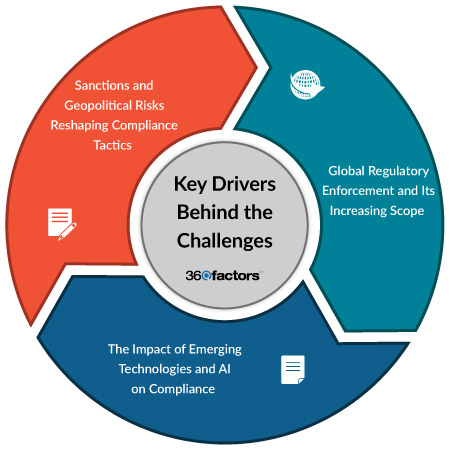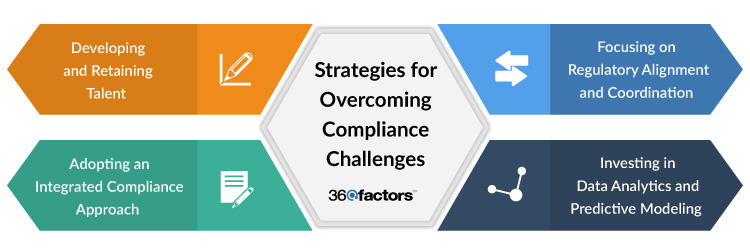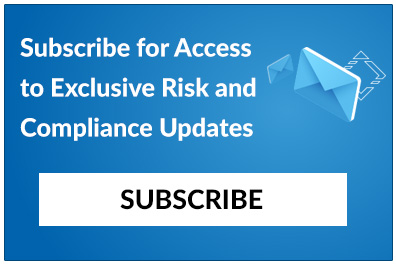Home/ Blog / Strengthening Effective Compliance Management for 2025 and Beyond
As 2025 approaches, financial organizations are experiencing a dynamic, complicated landscape full of multifaceted challenges that few enterprises can afford to overlook. The transformative potential of AI, new waves of regulatory demands, and the strategic use of data analytics are reshaping compliance management. Today, financial enterprises are experiencing significant uncertainties as stakes have never been higher: the regulatory scope is increasingly expanding, geopolitical issues are redefining compliance risk, and technological innovation is opening both opportunities and scrutiny.
With all these factors, effective compliance management is no longer just a legal obligation but a strategic move. Organizations that become experts in proactive compliance management are unlocking opportunities to drive efficiency, trust, and long-term resilience. The next generation of compliance leaders must move beyond traditional approaches, leveraging integrated compliance frameworks, predictive insights, and forward-thinking strategies to manage challenges effectively and ensure alignment with an ever-changing regulatory ecosystem.
The journey toward robust compliance for 2025 and beyond begins with understanding the key drivers of this transformation. Let’s explore the global, technological, and geopolitical forces shaping the future of compliance and strategies for overcoming compliance challenges.
Key Drivers Behind the Challenges

Global Regulatory Enforcement and Its Increasing Scope
The global regulatory atmosphere is undergoing unprecedented activity, resulting in an intense wave of rulemaking, enforcement, and guidance initiatives. Regulatory bodies are improving their strategies to safeguard corporate accountability and public interest for effective compliance management. In the United States, agencies like the SEC are tightening disclosure requirements on cybersecurity, climate impact, and insider trading. At the same time, the DOJ has revised its ‘Corporate Criminal Enforcement Policy’ to strengthen corporate ethics and compliance. Likewise, the UK’s Economic Crime and Corporate Transparency Act and the EU’s robust General Data Protection Regulation (GDPR) are redesigning industry compliance obligations.
These developments emphasize the need for enhanced regulatory alignment and coordination for compliance management. Organizations must adopt centralized systems to track evolving rules, engage proactively with regulators, and ensure consistency in enforcement and interpretation across jurisdictions.
The Impact of Emerging Technologies and AI on Compliance
The rise of emerging technologies, particularly AI, has introduced both transformative opportunities and significant regulatory scrutiny. While AI-powered effective compliance management solutions enable organizations to automate compliance monitoring, analyze compliance risks, and improve decision-making, they also create new areas of regulatory focus. For example, the European Union’s proposed AI Act focuses on the growing need for ethical AI deployment, emphasizing bias, transparency, and accountability.
AI’s growing adoption has also amplified the complexity of compliance. Regulators look closely at how organizations use AI in sensitive areas such as hiring, lending, and fraud detection, compelling businesses to develop strict controls and governance frameworks.
To navigate this evolving landscape, compliance teams must integrate emerging technologies into their frameworks while ensuring they align with ethical and regulatory standards. This includes investing in AI-based effective compliance management tools that offer predictive modeling, centralized data repositories, and real-time monitoring to strengthen compliance efforts.
Sanctions and Geopolitical Risks Reshaping Compliance Strategies
Geopolitical tensions and economic sanctions are creating new layers of complexity in compliance management. The Russia-Ukraine conflict has brought international sanctions into sharp focus, challenging businesses to ensure their operations are aligned with rapidly changing policies. Companies with significant ties to sanctioned nations face heightened scrutiny, requiring them to implement robust due diligence processes and risk assessment mechanisms.
Geopolitical risks such as trade restrictions, economic nationalism, and shifting alliances are forcing businesses to rethink their compliance strategies. Compliance management leaders must embrace a proactive approach, incorporating geopolitical risk analysis into their compliance frameworks to anticipate and adapt to evolving threats.
By integrating effective compliance management into their broader long-term strategies, businesses can mitigate exposure to geopolitical uncertainties and strengthen their global operations.
Strategies for Overcoming Compliance Challenges

Focusing on Regulatory Alignment and Coordination
Financial organizations must prioritize regulatory coordination and alignment as legal frameworks are becoming increasingly divergent and complicated. A reactive approach is inappropriate in the current evolving landscape; businesses require a proactive strategy incorporating compliance, government policy analysis, and legal and public relations functions into the mix. This cross-functional collaboration ensures a complete understanding of regulatory changes and their potential impact on strategic, operational, and reputational risks.
Organizations should establish centralized and effective compliance management systems to track and integrate new laws and regulations into a single repository. By doing so, they can maintain a clear and up-to-date view of their obligations across global, national, and regional levels. Proactive engagement with regulators is equally crucial, as open dialogue fosters mutual understanding while minimizing the risk of non-compliance due to misinterpretations or divergent enforcement standards.
Investing in Data Analytics and Predictive Modeling to Strengthen Compliance
Data analytics and predictive modeling are potent tools that can transform compliance efforts. By synergizing disparate data sources and implementing advanced analytics platforms, organizations can gain real-time insights into new regulations, detect potential vulnerabilities, and prioritize compliance efforts. Predictive modeling enables businesses to anticipate emerging compliance risks and make efficient decisions to address them.
Organizations can integrate these new technologies and processes through pilot projects to demonstrate their value for effective compliance management, operational efficiency, and decision-making. Businesses can build a strong case for broader technology adoption by showcasing measurable improvements achieved through these pilot projects.
Adopting an Integrated Approach for Holistic Compliance Management
The siloed approach to compliance management is becoming obsolete. To address the interrelated nature of modern regulatory mandates, organizations must adopt an integrated compliance framework that unifies various compliance areas such as anti-money laundering (AML), anti-bribery and corruption, cyber risk, data privacy, and environmental, social, and governance (ESG) obligations.
An integrated compliance management system provides a thorough view of an organization’s compliance posture, helping identify policy shortcomings and opportunities for improvement. This holistic perspective reduces inefficiencies and enhances an organization’s ability to respond to multifaceted compliance challenges. By leveraging centralized and effective compliance management platforms, compliance leaders can create an integrated compliance culture that drives better regulatory oversight and decision-making.
Developing and Retaining Talent to Build a Future-Ready Compliance Team
Talent is a critical aspect of a successful compliance program. As compliance challenges grow, organizations must invest in retaining and building a highly skilled, future-ready workforce. This involves enhancing the compliance function’s image and authority within the company to attract great talent.
Enhancing existing teams’ skills, particularly in emerging technologies and data analytics, is equally essential. Providing ongoing training and professional development opportunities strengthens compliance capabilities and boosts employee engagement and retention. To prepare for future challenges, businesses should focus on creating a diverse and agile compliance team that can adapt to changing demands while proactively addressing regulatory concerns.
Invest In AI-Based Compliance Management Software to Stay Ahead of Regulatory Demands
Nowadays, financial organizations face the dual challenges of maintaining robust compliance levels while managing costs. Conventional approaches relied on increasing the number of compliance personnel or manually researching and reviewing each new legislation. These methods are no longer efficient in dealing with escalating regulatory demands. To remain competitive, businesses must leverage AI-based effective compliance management solutions that enhance efficiency, reduce costs, and deliver actionable insights.
Predict360 Compliance Management Software offers a transformative approach to compliance management. It is designed to meet and exceed compliance expectations while streamlining workflows and reducing resource burdens. Predict360 CMS simplifies the compliance management lifecycle, ensuring businesses can monitor, manage, and adapt to regulatory changes in real-time. Its key features that empower organizations to address compliance challenges effectively include the following:
Centralized Compliance Platform: Combines all compliance-related information, data, discussions, and documents into a single, user-friendly system.
Executive Dashboards: Offer real-time compliance intelligence, enabling proactive decision-making and quicker responses to regulatory changes.
Streamlined Workflow & Processes: Automate compliance activities across departments, reducing manual workloads, improving efficiency, and enhancing effective compliance management.
Cloud-Based Solution: Quick to implement and scale, making it ideal for businesses of all sizes and industries.
Request a Demo
Complete the form below and our business team will be in touch to schedule a product demo.
By clicking ‘SUBMIT’ you agree to our Privacy Policy.



